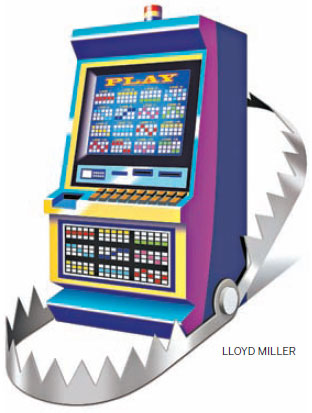When losing feels like winning
Updated: 2013-01-27 08:26
By Randall Stross(The New York Times)
|
|||||||

Step into a casino and chances are good that slot machines are filling much of the space, as far as the eye can see. That dominant presence reflects the preference of many customers for machine gambling over human-mediated table games. Not surprisingly, electronic game machines contribute a clear majority of revenue for casinos in general.
What may not be so evident is how a shift in casino gambling to screen-based games contributes to gambling addiction. Natasha Dow Schull, an associate professor at the Massachusetts Institute of Technology, spent considerable time in Las Vegas casinos as part of the research for a book she wrote, "Addiction by Design: Machine Gambling in Las Vegas." She met players who told her how they sought to enter a mindless state in which all else is obliterated. "You aren't really there - you're with the machine and that's all you're with," one subject said.
This isn't the only place where gamblers can reach such a state of mind. It's also known to occur at table games and at the racetrack. But casino machines arguably supply the most distraction-free gambling experience.
Speed is one design element of modern gambling machines that helps preserve that zone. When the machines' gear-driven handles were replaced by electronic push-buttons, the number of games that could be played in an hour doubled. On today's video slots, played with credit cards instead of coins, players can complete a game in as little as three seconds. There is virtually no opportunity to process what has just transpired.
Professor Schull expressed skepticism that players were making careful choices. "It's not just those who are vulnerable to addiction," she said. "I don't think any human being sitting there, two hours in, playing 1,200 games an hour, can be described as 'making decisions.' "
Kevin A. Harrigan, a research associate professor at the University of Waterloo in Ontario, Canada, has examined how electronic machines cause players to think that they've almost won - when they haven't.
Multi-line slot machines can be more addictive than older, single-line slot machines. In a typical setup, a player can bet on up to 20 different pay lines in a single game. If a player wins on 9 of the 20 lines, resulting in a net loss, the machine still celebrates the occasion with sound and video effects.
"It's brilliant," Professor Harrigan says. "I was playing 'Money Storm' in our lab and 'won' - nine lines were flashing - and it was cognitively difficult to appreciate that I had actually lost."
The American Gaming Association, the industry trade group, maintains that compulsive gambling on slot machines should be attributed to the psychological makeup of the players.
"Some people have difficulty gambling responsibly, as others are prone to use credit cards irresponsibly, or to drive cars recklessly," the group said in 2010.
Addiction specialists are concerned that the near-wins and false wins set off the same reward mechanism in the brain that is activated by actually winning a game.
In 2010, aiming to counteract this effect, the Queensland government in Australia enacted regulations that forbid display of a congratulatory message after a false win. That's a small improvement. An even better solution would be for machines to clearly label a loss as a loss.
The New York Times
(China Daily 01/27/2013 page11)